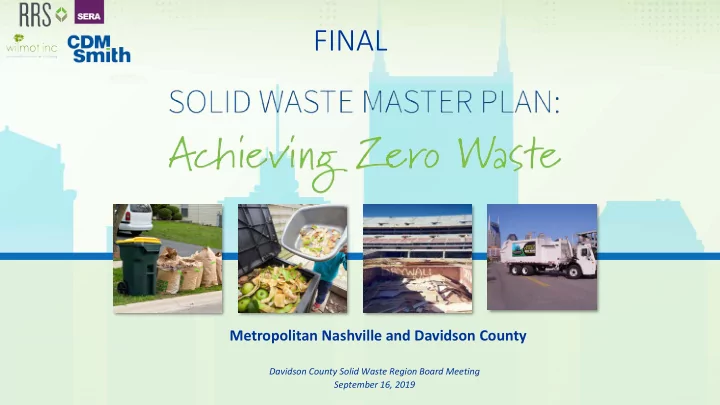

FINAL Metropolitan Nashville and Davidson County Davidson County Solid Waste Region Board Meeting September 16, 2019
The State of Solid Waste Management in Metro Nashville and Davidson County MSW Waste Landfilled, Recycled, & Composted 2016 Solid Waste Breakdown 82% 12% 6% Landfilled Recycled Composted C&D Waste Landfilled & Recycled National Average: 65% Landfilled 26% Recycled and 9% Composted 2
Identifying the Current Major Challenges Only 20% of solid waste services are under Metro management Insufficient funding for education and compliance Recycling is voluntary Limited options to landfilling food waste and C&D waste 3
Setting Goals and Priorities Adopt a Zero Waste Philosophy Minimize waste generation • Maximize landfill diversion (90+%) • Priorities for meeting these goals Strengthen public education and outreach Build countywide programs for recycling and surplus food rescue Revive recovery programs for C&D Waste 4
Transitioning from Disposal to Resource Management Over 80% of waste materials go to landfills The cost of landfilling is expected to increase 5
Critical Policy and Program Recommendations Recommendations are dependent on legislative support of policy and program funding . 6
Diversion Impacts of the Four Major Strategies 7
Triple Bottom Line (TBL) – What is the Value of the Plan? Aggressive Portfolio TBL Results TBL Benefits • Avoided carbon emissions • Economic activity and new jobs Evaluated conservative, moderate and aggressive portfolios Aggressive Portfolio • Lowest cost per ton • Highest total benefits per ton 8
Providing Flexibility with Plan Implementation Given Metro’s current budget constraints and the change in leadership, the Plan must be flexible Schedule can be adjusted to account for changing priorities, funding, or preferences Aggressive Schedule Five phases over 20 years Early adoption of policies, authority, and funding Extended Schedule Six phases over 30 years More gradual, pragmatic approach to system change Delayed rollout of key diversion programs 9
Implementing the Strategies in Phases Aggressive Extended Recommendations are dependent on legislative support of policy and program funding . 10
Implementing the Strategies in Phases Comparison of Aggressive and Extended Schedules KEY DIVERSION STRATEGIES AGGRESSIVE SCHEDULE EXTENDED SCHEDULE (20 YEARS) (30 YEARS) Metro authority, funding and policies Phase 1 Phase 1 Residential SAYT Phase 1 Phase 2 Public Space Recycling Phase 1 Phase 2 Enforcement of bans and mandates Phase 2 Phase 3 Expansion of convenience centers Phase 2 Phase 3 Residential franchising; commercial SAYT; and C&D deposit Phase 3 Phase 4 program Commercial franchising and multi-family strategies Phase 4 Phase 5 Re-manufacturing hub Phase 5 Phase 6 Recommendations are dependent on legislative support of policy and program funding . 11
Making the Plan a Reality Recommendations for Getting Started Issue an Establish an Launch a Finalize Draft Draft Food Executive Environ- Residential approach for Recycling Scraps Order on mentally Food Waste executing Mandates Diversion Waste Preferable Pilot strategies for C&D Mandates Reduction Purchasing Program under Metro Waste for Large within Program Charter Generators Metro Government Recommendations are dependent on legislative support of policy and program funding . 12
Questions?
San Jose Wet/Dry Commercial Waste Program Operations started in 2012 Targets commercial waste stream 8,000 businesses • Collects 300,000 tons/year • Private infrastructure system Mixed waste MRF • Organics Processing Services • One exclusive commercial hauler Commercial franchise agreement • Reduced from 20 haulers • Photo Source: Biocycle April 2014 article High Solids Anaerobic Digestion + Composting In San Jose
San Jose Wet/Dry Commercial Waste Program Advantages Simplifies sorting for customers Reduced fleet is more energy efficient Waste capture rate is 100% Photo Source: SWANA 2013 Excellence Award Application
San Jose Wet/Dry Commercial Waste Program Reasons for Not Recommending Processing facilities (MRF and organics) are large and complex Contamination levels are higher for mixed waste China’s National Sword Policy disrupted the recycling industry. Photo Source: Biocycle April 2014 article High Solids Anaerobic Digestion + Composting In San Jose Would San Jose have selected Wet/Dry in 2019?
Recommend
More recommend